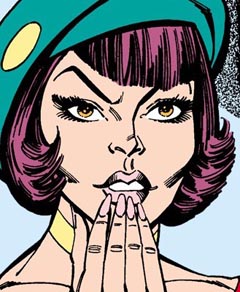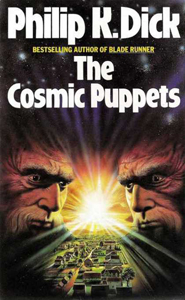“The Cosmic Puppets” (written in 1953, published in 1957) is a short but exceedingly weird battle between Good and Evil that plays out in the small town of Millgate, Virginia. There are plenty of subtexts a reader can bring to the table, but Philip K. Dick’s writing is unusually overblown here, none of his characters stick, and ultimately the book as a whole doesn’t stay in a reader’s mind despite the grand themes.
What is reality?
The most notable of those themes is PKD’s theory that reality is not a singular, tangible, universally observed thing. He would explore this in more robust and amusing fashion in “Eye in the Sky,” published in the same year. In “The Cosmic Puppets,” Millgate native Ted Barton finds his hometown has changed during his 18 years away.
Roughly the first half of this 186-pager is good reading of the “Where the heck is this going?” variety. Once we find out Ted’s Millgate has been magically overwritten by a different Millgate, and that Ted also possesses magic (somehow), the enjoyment level drops.

“The Cosmic Puppets” (1957)
Composition year: 1953
Author: Philip K. Dick
Genre: Science fiction
Setting: Undated; Milgate, Virginia
Basically by thinking really hard about it, Ted and another native, the old drunk William Christopher, are able to change part of the town back to its original state, transforming a line of stores back into a park. Then they work to change the whole town back, but they have opposition.
At first I thought PKD might be tapping into that ephemeral, nostalgic idea that home is a place that exists in your mind and heart, but not in reality – especially once you go out into the wider world as an adult. Ted is perhaps using (unexplained) magic to bring his childhood home into being again.
But the author spends so many words on Western-style theology that I think that’s what he’s more concerned with here. Unlike in “Eye in the Sky,” where PKD rips the religious man and the superstitious woman, in “Cosmic Puppets” he takes the grand fight between Good and Evil seriously – inasmuch as the book culminates with a battle so grand that it flirts with being boring.
Unpleasant fight sequences
Barton fights off snakes, rats and spiders – as well as 3-inch-tall golems formed from clay by the gods — and it’s not pleasant reading. PKD also makes a half-hearted attempt at a mystery wherein we wonder who is serving which side, with one pseudo-child being the good god and another being the evil god. There’s also a woman who is revealed to be Mother Earth, and PKD wraps it all up with a goofy hills/breasts comparison that fits better in a “Naked Gun” movie.
The character writing is weak in “The Cosmic Puppets.” One might assume this book is by someone just learning to write characters, but very shortly after this, PKD wrote his outstanding 1950s California novels about marital relationships and small businesses.

Ted is bland even for an Everyman audience surrogate trapped in Millbank and learning its magical rules; his only relationship is with his wife, but he doesn’t care when that falls apart. Everyone else is either hard to pin down (as the author swings and misses at mysterious qualities for the two “children”) or just flat-out says what they stand for, as with Dr. Meade: He remembers the old town but is scared to go back, so he briefly stands in Ted’s way.
“The Cosmic Puppets” is a case of PKD working through ideas but not gluing them together in satisfying fashion. What’s more, the “playing god” theme is found in a pair of 1953 short stories where they get more focus. “Small Town” is about a man whose model town represents a real town, and “Project: Earth” is about a man who creates small golems who live real lives. Those stories are not strong, either, but experimentation is more forgivable in short stories because we aren’t making a big time commitment.
When Ted finds he’s trapped in Millgate by bizarre outside forces, it is very similar to the recent TV series “Wayward Pines,” which goes to show that even PKD’s lesser works are influential or at least part of a continuum in sci-fi literature. But my main impression of “The Cosmic Puppets” is that PKD was grasping for a good “playing god” story in 1953 and couldn’t quite find it – at least not just yet.

